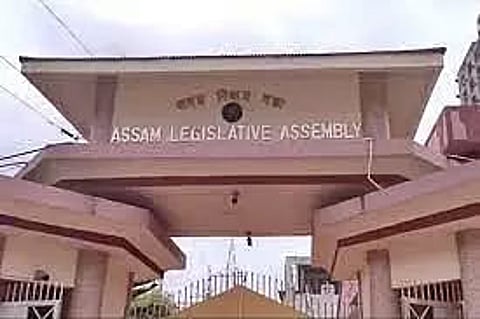
- Home
- Live Blog
- Breaking News
- Top Headlines
- Cities
- NE News
- Sentinel Media
- Sports
- Education
- Jobs

GUWAHATI: The Assam Cabinet, in its session held in Kokrajhar on Monday, announced several key decisions including one to give assent to The Assam Repealing Act, 2022 in the next session of the Assam Assembly.
Assam CM Himanta Biswa Sarma informed at the end of the Cabinet's Kokrajhar Session that the Act will be passed by the state Assembly during its next session.
The Assam Repealing Act, 2022, received the assent of the Governor on May 17, 2022 and was notified on May 20, 2022.
The Act, referred to as Assam Act No XVIII of 2022, seeks to repeal certain obsolete Acts like The Assam Ganja and Bhang Prohibition Act, 1958, The Assam Opium Smoking Act 1927, Assam Opium (Amendment) Act 1933, The Assam Opium Prohibition Act, 1947, The Assam Opium Amendment (Autonomous Districts) Act, 1954 and Assam Temperance Act, 1926.
The Acts have become redundant due to amended Acts being passed subsequently. Whole Acts would be repealed by the Assam Repealing Act, 2022.
Earlier, in 2020, The Assam Repealing Act, 2020 repealed the Assam Madrassa Education (Provincialisation) Act, 1995 and the Assam Madrassa Education (Provincialisation of Services of Teachers and Reorganisation of Educational Institutions) Act, 2018. It was approved by the Governor of Assam on January 27, 2021 and Notified in the Assam Gazette on Jan 30,2021
The Assam Ganja and Bhang Prohibition Act, 1958, also known as Assam Act No XXI of 1959, sought to prohibit cultivation, collection, possession, consumption, manufacture or sale of Ganja in, and of smuggling thereof into the State of Assam and to restrict cultivation, collection, possession, consumption, manufacture or sale of Bhang with a view to effect its ultimate prohibition in the State of Assam. This Act was succeeded by Assam Ganja and Bhang Prohibition (Amendment) Act, 1961.
Assam Opium Smoking Act, 1927 or the Assam Act 3 of 1927, published in the Assam Gazette of the 9th November, 1927, was enacted to provide for the prohibition of opium smoking. The Act sought to impose Penalty for smoking opium, smoking opium in company, opium smoking assembly or being a member of opium smoking assembly and presumption raised by presence of opium and opium smoking apparatus. There was also Penalty for opening, keeping or having charge of place used for such assembly and for dealing in opium dross. Opium includes 'prepared opium' which means chandu, madak, opium dross or the scrappings from the opium pipe and every other preparation or admixture of opium which may be used for smoking.
Similarly, The Assam Opium Prohibition Act, 1947, was also passed to prohibit consumption (except for medicinal purposes) and smuggling of Opium in the Province of Assam, as it was known then. The Act sought to prohibit any person from importing, exporting, transporting and possessing of opium, sale and purchase of opium, consumption of opium, with nobody allowed to keep any material, utensil, apparatus etc. for consumption of the banned substance.
Assam Opium (Amendment) Act, 1933 or the Assam Act 1 of 1933 was an Act to amend the Opium Act, 1878. This Act provided for an increase in the quantum of punishment and also saw the insertion of new sections.
The Assam Opium Amendment (Autonomous Districts) Act, 1954, which received the assent of the Governor of Assam on the 10th December 1954, sought to extend the provisions of the Assam Opium (Amendment) Act, 1933 to Autonomous Districts of Assam. The Assam Opium (Amendment) Act, 1933 (Act 1 of 1933) was not in force in the Autonomous Districts of Garo Hills, Mikir Hills and North Cachar Hills Districts, whereas the Opium Act, 1878 (Act 1 of 1878) was in force.
The Assam Temperance Act, 1926, was passed with the objective to authorise the electors in selected areas to exercise the option of limiting the number of liquor shops in such areas and thereby gradually promote temperance.
Also Watch: